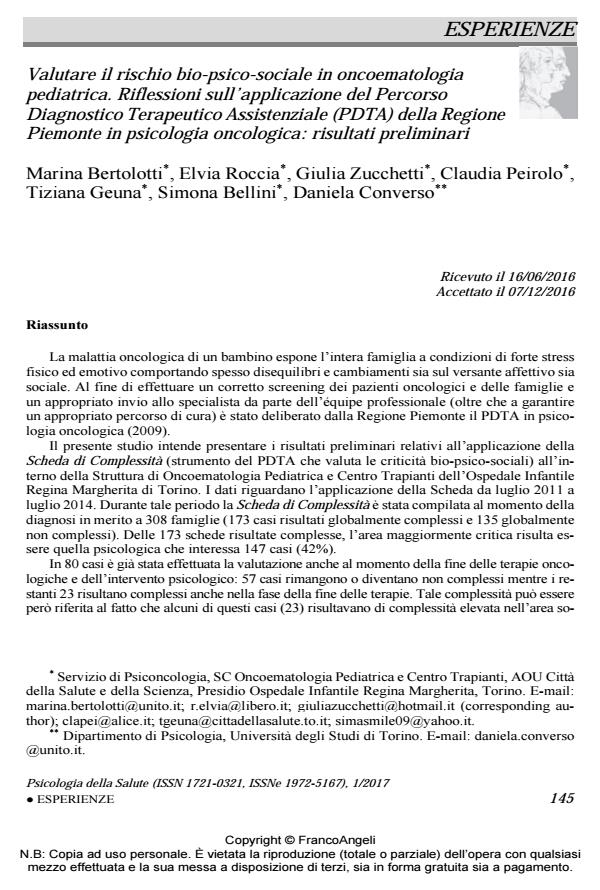Evaluation of bio-psycho-social risk in pediatric oncology. Application of the Diagnostic Asisstance Therapeutic Pathway in psychoncology: preliminary results
Journal title PSICOLOGIA DELLA SALUTE
Author/s Marina Bertolotti, Elvia Roccia, Giulia Zucchetti, Claudia Peirolo, Tiziana Geuna, Simona Bellini, Daniela Converso
Publishing Year 2017 Issue 2017/1
Language Italian Pages 14 P. 145-158 File size 245 KB
DOI 10.3280/PDS2017-001008
DOI is like a bar code for intellectual property: to have more infomation
click here
Below, you can see the article first page
If you want to buy this article in PDF format, you can do it, following the instructions to buy download credits

FrancoAngeli is member of Publishers International Linking Association, Inc (PILA), a not-for-profit association which run the CrossRef service enabling links to and from online scholarly content.
The oncological illness of a child puts the whole family in front of important physical and emotional stress often resulting in imbalances and changes both on the emotional and social family aspects. In order to make a proper screening of patients and families and to make a proper sending to the specialist from the professional team (as well as to ensure an appropriate care pathway) was approved by the Piedmont Region the Diagnostic and Therapeutic Assistance Path (PDTA) in Psychoncology. This study aims to present the preliminary results of the application of "La Scheda di Complessità" (instrument of the PDTA that evaluate the biological-psychological-social-assistance complexity) within the SC Pediatric Oncology and Transplantation Center Hospital in Turin. The data were collected from July 2011 to July 2014. It referred to 308 families at the moment of the diagnosis (173 cases globally complex and 135 globally non-complex). In the 173 cases complex, the most critical area is that psychological that affects 147 cases (42%). In 80 cases, it was already carried out also the assessment at the time of the end of the therapies, which shows that 57 cases remain or become non-complex while 23 cases result complexes in the phase of the end of the therapies. This complexity can be, however, referred to the fact that some of these cases (23) were high in the social complexities while others (7) had a psychological complexity / psychiatric previous to diagnosis. "La Scheda di Complessità" therefore is a useful tool for assessing any risks in families, for choosing the appropriate intervention and for evaluating the outcome.
Keywords: Cancer patients, psychoncology, family, PDTA
- Effects of a high-intensity psychosocial intervention among child–parent units in pediatric oncology Giulia Zucchetti, Giorgia Ambrogio, Marina Bertolotti, Luigi Besenzon, Fabio Borghino, Filippo Candela, Chiara Galletto, Franca Fagioli, in Tumori Journal /2020 pp.362
DOI: 10.1177/0300891620926226 - Il trattamento psicoterapeutico nella Sindrome Fibromialgica: le applicazioni della terapia dinamica breve in un setting ospedaliero italiano Annunziata Romeo, Valentina Tesio, Benedetta Vicino, Fabrizio Colonna, Enrico Fusaro, Daniela Converso, Lorys Castelli, in PSICOLOGIA DELLA SALUTE 1/2019 pp.119
DOI: 10.3280/PDS2019-001007 - Psychological Impact of COVID-19 on Parents of Pediatric Cancer Patients Antonella Guido, Elisa Marconi, Laura Peruzzi, Nicola Dinapoli, Gianpiero Tamburrini, Giorgio Attinà, Mario Balducci, Vincenzo Valentini, Antonio Ruggiero, Daniela Pia Rosaria Chieffo, in Frontiers in Psychology 730341/2021
DOI: 10.3389/fpsyg.2021.730341
Marina Bertolotti, Elvia Roccia, Giulia Zucchetti, Claudia Peirolo, Tiziana Geuna, Simona Bellini, Daniela Converso, Valutare il rischio bio-psico-sociale in oncoematologia pediatrica. Riflessioni sull’applicazione del Percorso Diagnostico Terapeutico Assistenziale (PDTA) della Regione Piemonte in psicologia oncologica: risultati preliminari in "PSICOLOGIA DELLA SALUTE" 1/2017, pp 145-158, DOI: 10.3280/PDS2017-001008